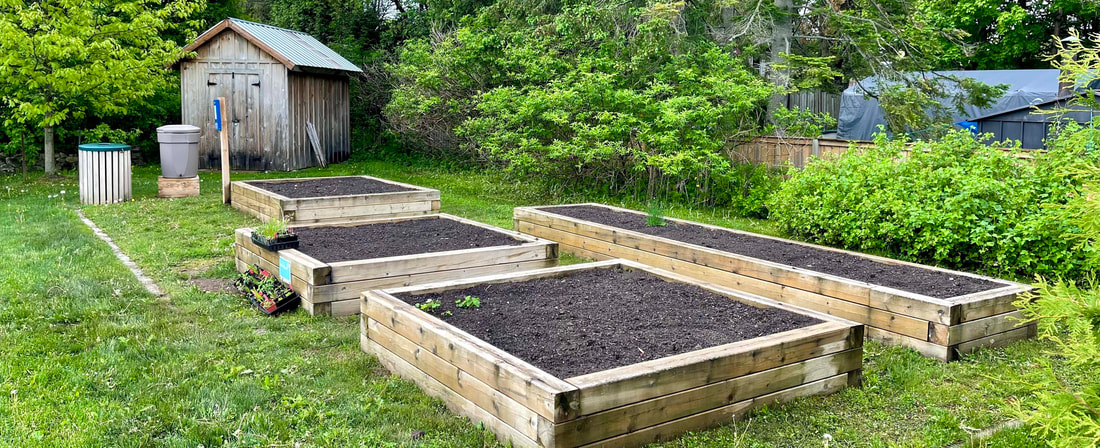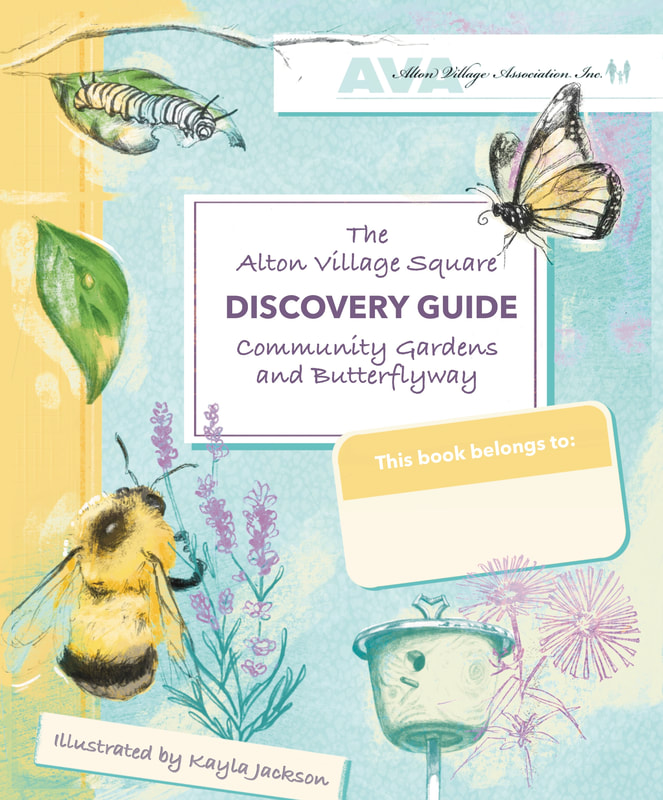Alton Village Square Community Gardens
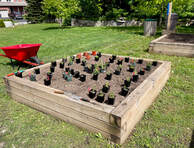
Project Butterflyway and Community Gardens
In 2021, the Town of Caledon was recognized by the David Suzuki Foundation, as a Butterflyway community. Residents in Alton Village were inspired by the efforts of Janice Fisher and her team of volunteers in planting many pollinator gardens across Caledon and wanted to build on what had already been accomplished.
The Alton Village Butterflyway began in 2021 as an initiative of the Alton Village Association.
In 2022, the first community pollinator (habitat) garden was established in the Square, thanks to sponsorship and support from Lynx and Hare Cycles, Stephan Schneider and Shannon McCauley. The Alton Village Butterflyway Facebook page was also created to keep residents and volunteers updated.
A Climate Action Fund Application was submitted to the Town of Caledon and in February 2023 Town staff recommended that AVA receive $6,000 to expand our community pollinator and vegetable gardens. This will be based on Town Council approval. Documents related to the Climate Action Fund are provided below.
"Wild pollinators such as butterflies and bees are crucial to human survival. Climate change, land development and pesticide use threaten their survival, and therefore ours as well. The Butterflyway Project helps people create viable pollinator habitat in neighbourhoods across Canada." ~ David Suzuki Foundation
In 2021, the Town of Caledon was recognized by the David Suzuki Foundation, as a Butterflyway community. Residents in Alton Village were inspired by the efforts of Janice Fisher and her team of volunteers in planting many pollinator gardens across Caledon and wanted to build on what had already been accomplished.
The Alton Village Butterflyway began in 2021 as an initiative of the Alton Village Association.
In 2022, the first community pollinator (habitat) garden was established in the Square, thanks to sponsorship and support from Lynx and Hare Cycles, Stephan Schneider and Shannon McCauley. The Alton Village Butterflyway Facebook page was also created to keep residents and volunteers updated.
A Climate Action Fund Application was submitted to the Town of Caledon and in February 2023 Town staff recommended that AVA receive $6,000 to expand our community pollinator and vegetable gardens. This will be based on Town Council approval. Documents related to the Climate Action Fund are provided below.
"Wild pollinators such as butterflies and bees are crucial to human survival. Climate change, land development and pesticide use threaten their survival, and therefore ours as well. The Butterflyway Project helps people create viable pollinator habitat in neighbourhoods across Canada." ~ David Suzuki Foundation
Climate Action Fund Documents
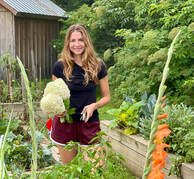
Volunteers
Thanks to community volunteers like Emily Quinton, there have been plenty of vegetables for local residents to enjoy. Emily has been planting, weeding and watering the raised bed vegetable gardens in the Alton Village Square for the last four years. Link to blog for more info: Veggie Gardens
We are now looking for volunteers in 2023 to help us with "Project Butterflyway and Community Gardens". Please email us for more information: [email protected]
For Upcoming Events related to our Butterflyway and Community Gardens Link Here
Thanks to community volunteers like Emily Quinton, there have been plenty of vegetables for local residents to enjoy. Emily has been planting, weeding and watering the raised bed vegetable gardens in the Alton Village Square for the last four years. Link to blog for more info: Veggie Gardens
We are now looking for volunteers in 2023 to help us with "Project Butterflyway and Community Gardens". Please email us for more information: [email protected]
For Upcoming Events related to our Butterflyway and Community Gardens Link Here
What's so special about a native plant?
Here are 3 Links to information sources that explain what a native plant is and why they are important.
Here are 3 Links to information sources that explain what a native plant is and why they are important.
- American Society of Landscape Architects - 5 reasons native plants help save you money and the planet
- Ontario Nature
How could my garden qualify to be included in the Alton Village Butterflyway network?
The Butterflyway Project is a volunteer-driven campaign that aims to create networks of butterfly-friendly habitat in communities throughout Canada, started in 2017 by The David Suzuki Foundation. The goal of the Butterflyway Project is to create Butterflyways and generally, to increase pollinator awareness and action in communities.
A ButterflyWay is defined by the David Suzuki Foundation (DSF) as a network of 12 or more native plant gardens. Gardens included in a ButterflyWay can be any size and number of plants, but must include a mix of native wildflowers, grasses, shrubs and trees, ideally sourced from local native plant suppliers. You can plant in a window box, on a balcony rooftop, in a community garden, beside a road, in a park – the options are limitless.
Gardening with plants native to our area supports local biodiversity. They provide seeds and berries for birds and energy-rich nectar and protein-filled pollen for insects, like bees and butterflies. Native plants are also adapted to local climate and soils, so generally require less care and watering. When you go to purchase native plants for your garden, it is recommended that you use the Botanical (scientific) name to ensure you have the correct plant.
Here are four guides to some of the best native plants for a Butterflyway garden within the Greater Toronto Area and the Credit Valley Watershed.
More links below. Contact us if you would like to be recognized for your garden and receive a David Suzuki Butterflyway Sign.
The Butterflyway Project is a volunteer-driven campaign that aims to create networks of butterfly-friendly habitat in communities throughout Canada, started in 2017 by The David Suzuki Foundation. The goal of the Butterflyway Project is to create Butterflyways and generally, to increase pollinator awareness and action in communities.
A ButterflyWay is defined by the David Suzuki Foundation (DSF) as a network of 12 or more native plant gardens. Gardens included in a ButterflyWay can be any size and number of plants, but must include a mix of native wildflowers, grasses, shrubs and trees, ideally sourced from local native plant suppliers. You can plant in a window box, on a balcony rooftop, in a community garden, beside a road, in a park – the options are limitless.
Gardening with plants native to our area supports local biodiversity. They provide seeds and berries for birds and energy-rich nectar and protein-filled pollen for insects, like bees and butterflies. Native plants are also adapted to local climate and soils, so generally require less care and watering. When you go to purchase native plants for your garden, it is recommended that you use the Botanical (scientific) name to ensure you have the correct plant.
Here are four guides to some of the best native plants for a Butterflyway garden within the Greater Toronto Area and the Credit Valley Watershed.
- Best Native Plants - David Suzuki Foundation Butterflyway Project
- Best Native Plants for Toronto Area
- CVC Guide to Native Pollinator Plants **
- Keystone Native Plants - Ecoregion 8 NWF
More links below. Contact us if you would like to be recognized for your garden and receive a David Suzuki Butterflyway Sign.
Funding Support
The Landowner Action Fund is Credit Valley Conservation’s (CVC) environmental incentive program for rural landowners living within the Credit River Watershed.
For Private Lands. Eligible private landowners can apply to the Landowner Action Fund (LAF) for funding assistance with their pollinator projects. There are 3 categories that could help with these types of projects.
There is also corporate support. See Greening Corporate Grounds. Contact CVC for more info: [email protected]. 905-670-1615 | 1-800-668-5557
The Landowner Action Fund is Credit Valley Conservation’s (CVC) environmental incentive program for rural landowners living within the Credit River Watershed.
For Private Lands. Eligible private landowners can apply to the Landowner Action Fund (LAF) for funding assistance with their pollinator projects. There are 3 categories that could help with these types of projects.
- Grassland Restoration (projects > 0.5 acres)
- Pollinator Patches (projects 0.5 acres and less)
- Sustainable Gardening (one time use) for more details
There is also corporate support. See Greening Corporate Grounds. Contact CVC for more info: [email protected]. 905-670-1615 | 1-800-668-5557
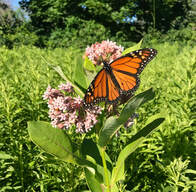
Butterflyway Gardening Resources
Links
Organizations (For Inspiration and Learning)
Where to buy Native Plants
Links
- Alton Village Butterflyway Facebook
- How to Create a Butterfly Garden
- The Best Native Plants for your Butterfly Garden
- CVC Guide to Native Pollinator Plants
- CVC Guide to Gardening Wisely
- 10 Things to Get You Started by Douglas Tallamy
- 8 Simple Actions that individuals can take to save insects from global declines - PNAS (Proceedings of the National Academy of Sciences)
- You may not like insects but you need them by David Suzuki
Organizations (For Inspiration and Learning)
- Blooming Boulevards - 2023 Webinars
- City of Guelph - Pollinator Gardens
- Pollination Guelph - PDF Downloads
- TRCA - Complete Guide to Building a Rain Garden
- Pollinator Partnership
- Xerces Society - Pollinator Conservation Program
- Home Grown National Park
Where to buy Native Plants
Books
- A Garden for the Rusty-Patch Bumblebee - by Lorraine Johnson, Sheila Colla
- Bees, An Identification and Native Plant Forage Guide - by Heather Holm
- Nature's Best Hope, A New Approach to Conservation that Starts in Your Yard - by Douglas Tallamy
- Braiding Sweetgrass, Indigenous Wisdom, Scientific Knowledge, and the Teachings of Plants - by Robin Wall Kimmerer
- The Well-Gardened Mind, The Restorative Power of Nature by Sue Stuart-Smith
Alton Village Butterflyway and Native Plant Gardens
- Alton Village Square - 1447 Queen Street W
- Alton Park Rain Garden - 31 Station Street
- Alton Village Resident Gardens - TBD 2023
Other Pollinator Gardens that you can visit locally
- Mono Pollinator Garden
- Village of Inglewood Pollinator Garden (in front of the library)
- Butterflyway Garden - Caledon Public Library in Bolton
- Pollinator Garden Planting Sites in Guelph (including Eastview Pollinator Park, a pollinator habitat on the 45ha (112 acre) decommissioned Eastview Landfill site, one of the first and largest pollinator initiatives to occur in Ontario, Canada, and internationally).
“In the past, we have asked one thing of our gardens: that they be pretty. Now they have to support life, sequester carbon, feed pollinators and manage water.”
~ Dr. Douglas Tallamy
~ Dr. Douglas Tallamy
EDUCATION ~ EXCITEMENT ~ ENGAGEMENT ~ EXPANSION
